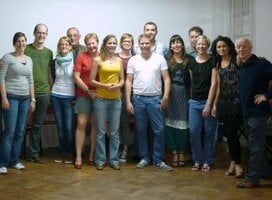Dutch Language Schools Abroad
Dutch is spoken throughout the Netherlands and is the official language in parts of Belgium. Independent Caribbean islands that are part of the the Kingdom of Netherlands and the Dutch colony of Suriname also speak Dutch. This Germanic language also has traces in the Afrikaans language. Around 23 million people speak Dutch as their first language, and many more are learning it as their second or third.
Perhaps you are interested in learning Dutch because your family heritage is rooted in areas around Netherlands and Belgium. Maybe you are hoping to apply for a job that requires advanced Dutch language skills. Or, maybe you just love the Dutch culture and want to be closer to it.
Regardless of the reason, you will find plenty of options to pursue, and will surely have fun doing so. If you choose to study in the Netherlands or Belgium, you can take advantage of the close proximity to some of the most sought-after sites and cities in the world.
The three most common ways to learn Dutch abroad are through language schools, private tutoring, or through classes at the university level. Each type has its pros and cons, but if you know what your goals are, it's not too difficult to make your choice.
Course Types
If you are looking for a relatively fast-paced, less expensive, and intensive course, then language schools offer short-term classes for all levels for Dutch speakers. There are several organizations available to help place you in the course that will best suit your needs. They will also help with logistics of travel and accommodations.
For a slightly more intense experience you can find a tutor for one-on-one training. The cost for a private tutor usually jumps up significantly from small group classes.
With both of these course types, language schools and tutoring, you can combine the in-class time with additional experiences like cultural excursions and tours. You can also choose a focus for the course if you have a specific need. Some examples include: Dutch for business, training for specific exams, medical terms, and more.
Taking courses at the university level will most likely mean spending more and staying abroad longer. If you enroll directly to a university, you can expect to complete an undergraduate degree in at least three years. If you are completing a study abroad or exchange experience, you will be able to choose from a summer, semester, or year. Unless you are majoring in Dutch, the language classes will be once per week and therefore less intensive than one-on-one or small group options.
Why Learn Dutch Abroad
Dutch may not be the first language that comes to mind when thinking about becoming multilingual, but that fact can actually be a beneficial reason to learn Dutch. Because the language is not as commonly studied as Spanish or Chinese, putting Dutch language skills on a resume will instantly differentiate you from others in the applicant pool.
Another benefit of choosing to learn Dutch abroad is the guarantee of spending time in one of several beautiful and fascinating locations. Both the Netherlands and Belgium offer top notch language training alongside a wealth of cultural and historical sites and tours; Caribbean islands where Dutch is spoken have an obvious draw too.
Qualifications
If you will be starting from square-one in your Dutch language learning, you will likely only need to worry about having a passport and possibly a visa, depending on the length of your stay. For both Belgium and the Netherlands, no visa is needed from U.S. citizens if you'll be there for fewer than 90 days.
There might be an essay process and additional paperwork, particularly if you are applying for a scholarship. If you are planning to apply for a more advanced level of Dutch classes, proof of sufficient skills will most likely be needed.
With location, cost, duration, and more to consider, it's best to begin the planning process as soon as you are able. Belgium and the Netherlands offer a range of options for learning Dutch, but they are also more expensive locations than most U.S. cities so it's best to begin saving for your time abroad as early as possible as well.
Popular Locations to Learn Dutch
While there are several countries on multiple continents that commonly speak Dutch, you will find the majority of Dutch classes are offered in Belgium and the Netherlands.
Brussels is the most common place in Belgium to learn Dutch, but Flanders is also a possible option. French, Dutch, and English are all spoken in Brussels, and the combination is a beautiful thing to experience. This guide on studying abroad in Belgium can give you more specifics and helpful tips.
Dutch is spoken throughout the Netherlands so there will be more options for locations allowing for different types of experiences. Amsterdam is the most popular but many smaller towns give you the chance of a slower pace of life and fewer interactions with tourists. For more advice on studying in the Netherlands, we have a guide to help.
Choosing a Dutch Learning Program
If you study Dutch abroad, and don't already know someone living there, going through a provider or placement service will make the process much smoother for you. Starting from the first step of choosing the program all the way through your return flight, a third party will be there at every turn.
An initial online search for Dutch language training will provide a list of several organizations that have agreements with language schools and tutors. You can research and compare prices, details on housing, classes, locations, and more. Staying with a host family is the most common accommodation option and a great way to get more out of the experience.
If you are considering enrolling directly to a university or college to learn Dutch, then the international office will be prepared to answer questions and facilitate the process from start to finish. If college credit is a must for you, but a full three years is a little too long, you can visit the international office at your home college and ask about study abroad and exchange options in Belgium and the Netherlands.
The cost of learning Dutch abroad can range widely depending on what type of instruction you choose and how long you choose to stay. If you enroll in the language program with the help of an outside organization (which makes life much easier on you) the cost of tuition will likely be part of one total fee that includes housing and various other fees.
Average Language School Tuition
Studying abroad is the most expensive way to study Dutch abroad because you will get college credit and will likely stay for at least one full semester. If you go through a third party provider the cost can range from around $20,000 for one semester to $37,000 for a full year.
Keep in mind this price will likely include plane tickets, housing, tuition, excursions, and other college fees. Also keep in mind scholarships are easier to find if you are attending a college versus a language specific school.
Language schools and private tutors generally list prices for classes by the week or two weeks. Private tutoring is the more expensive than group classes but, with a good teacher and sincere work ethic, you will learn a great deal in a short amount of time.
Private tutors, will cost around 1000 to 1500 EUR per week. This price often includes room and board and additional amenities. Tuition for group courses starts at 950 EUR for two weeks of lessons and can also include accommodation and meals. Studying Dutch in Belgium is slightly less expensive than studying in the Netherlands.
Scholarship Options for Learning Dutch
Most third party providers offer scholarships for all types of study abroad particularly for underrepresented study abroad participants including first generation college students and minority students. If you are planning to study dutch through an exchange partnership, you might be able to use any scholarships or funding that are currently available at your home university.
Many universities in Belgium and the Netherlands offer scholarships for students coming to learn the Dutch language. You are less likely to find scholarships specific to language schools, but you can get creative with fundraising events and online donation sites where family any friends can support your goals.














